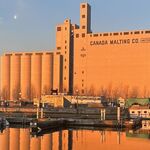Northern Light
Superstar
Some of you may know that the province, under every political party, has continuously allowed logging in Algonquin Park since its inception.
This is the only Provincial Park for which this is true.
While the logging practices in Algonquin are among the most sustainable in the industry, rarely employing clearly cutting; they are still the antithesis of protected space.
To have a sense of why..............first, contemplate that this logging is facilitated by a whopping 6,000km of logging roads!
The presence of these roads obviously damages, interrupts and alters habitat above and beyond the logging itself.
***
Many here who have enjoyed visiting the park may also be aware that its campgrounds and trails near Highway 60 can fill and seem unreasonably busy for an escape from it all.
But when you see how little of the park is really reserved to nature and people's enjoyment thereof; you can come to realize, it needn't be this way.
To that end...........here is the proposed Forestry Operations Map for Algonquin for the next decade:
Note that Green is the proposed logging area; while Grey is the land reserved to nature/people.

All of that info is by way of saying that I would invite people to comment on the proposed Forestry Plan between now and mid-January and encourage a greater proportion of land be set aside for nature; and that logging be phased out over time.
The consultation page is here: https://nrip.mnr.gov.on.ca/s/consultation-notice?language=en_US&recordId=a0z3g000000oWBJAA2
For a quick overview of the issue, see this article from Mike Crawley of CBC:
This is the only Provincial Park for which this is true.
While the logging practices in Algonquin are among the most sustainable in the industry, rarely employing clearly cutting; they are still the antithesis of protected space.
To have a sense of why..............first, contemplate that this logging is facilitated by a whopping 6,000km of logging roads!
The presence of these roads obviously damages, interrupts and alters habitat above and beyond the logging itself.
***
Many here who have enjoyed visiting the park may also be aware that its campgrounds and trails near Highway 60 can fill and seem unreasonably busy for an escape from it all.
But when you see how little of the park is really reserved to nature and people's enjoyment thereof; you can come to realize, it needn't be this way.
To that end...........here is the proposed Forestry Operations Map for Algonquin for the next decade:
Note that Green is the proposed logging area; while Grey is the land reserved to nature/people.
All of that info is by way of saying that I would invite people to comment on the proposed Forestry Plan between now and mid-January and encourage a greater proportion of land be set aside for nature; and that logging be phased out over time.
The consultation page is here: https://nrip.mnr.gov.on.ca/s/consultation-notice?language=en_US&recordId=a0z3g000000oWBJAA2
For a quick overview of the issue, see this article from Mike Crawley of CBC:




